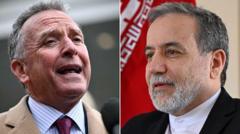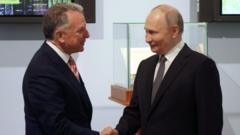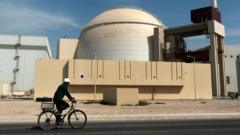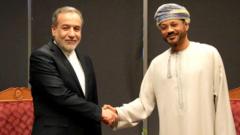Prime Minister Netanyahu's strong stance against Iran faces a challenge as Trump calls for negotiations with the nation. This unexpected move has led to mixed reactions among Israelis, with some advocating for military action given Iran's nuclear advancements and perceived vulnerabilities.
Israelis Divided Over Trump's Iran Negotiation Strategy

Israelis Divided Over Trump's Iran Negotiation Strategy
Amid President Trump's surprising announcement to engage in direct talks with Iran, many Israelis express skepticism about the efficacy and timing of the approach.
In a striking twist in U.S.-Iran relations, President Trump announced on Monday that the United States would pursue direct negotiations with Iran, while Israeli Prime Minister Benjamin Netanyahu stood by his side. This development comes as many Israelis express surprise, especially considering Netanyahu's long-standingdesignation of Iran as the gravest threat to Israel, often labeling it as “Iran, Iran, and Iran.”
Netanyahu has consistently positioned himself as Israel's frontline defender against Iranian nuclear pursuits and has frequently engaged in confrontations with Iran and its allied militias in neighboring regions. The announcement of talks elicited varied reactions from Israeli citizens and experts, casting doubt on the viability of diplomacy, especially with Iran's nuclear program currently at an advanced stage.
The Israeli media extensively covered Trump's declaration, with various commentators debating the implications of negotiations versus military action. Some analysts argue that this is an opportune moment for Israel to consider pre-emptive strikes on Iranian facilities, asserting that Iran's traditional allies, including Hezbollah and Syria, are currently weakened, potentially making them less capable of retaliation.
This negotiation represents a significant shift, as it marks the first time official talks could occur since Trump rejected the Obama-era nuclear agreement—an accord that Netanyahu vigorously opposed. During the announcement at the Oval Office, Netanyahu emphasized his ongoing discussions with Trump regarding Iran, indicating a shared objective to thwart any Iranian ambitions of nuclear armament, and expressing cautious optimism that diplomatic solutions could succeed if they are comprehensive.
The complexity of this situation reflects the deep-rooted geopolitical tensions in the region, with the prospect of negotiations stirring intense debate not only among political leaders but also within the Israeli populace.






















